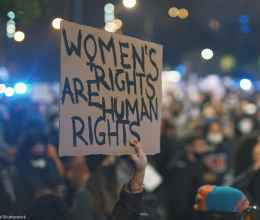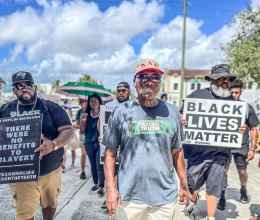
TALLAHASSEE, FL - The House Judiciary Committee today voted to pass House Bill 1 (HB 1), Gov. DeSantis’s anti-peaceful protest bill. The proposal would mandate harsher criminal penalties against protesters exercising their First Amendment right to protest and have a disproportionate impact on Black and brown Floridians. With its passage in the House Judiciary Committee, the bill is now on its way to be heard and voted upon by the full House.
The ACLU of Florida opposes this bill and its companion bill, Senate Bill 484.
Micah Kubic, executive director, ACLU of Florida responded to today’s vote saying:
“Gov. DeSantis’ anti-protest bill is hostile to the First Amendment rights of Floridians and runs afoul to our American story. Protests have forged our country’s democracy since its inception and it must remain an unfettered right. For generations, peaceful protest has achieved important social change, from ending child labor and school segregation to increasing environmental standards and workplace safety. Criminalizing peaceful protests, as HB1 attempts to do, goes against the very fabric of our Constitution. The fact that this bill remains the governor's top legislative priority despite all the real challenges facing Florida speaks volumes about Gov. Desantis’ disregard for Floridians health, safety and civil rights.
“We have not lost sight that this bill would also disproportionately target Black and brown Floridians. The bill’s language is purposely designed to protect confederate monuments and other shrines to white supremacy over people, to allow the Florida governor and cabinet to veto a city's budgeting decision if they touch local police budgets, and to allow violent counter-protestors to escape civil liability for injuring or killing a protestor.
“Simply put, HB1, and its companion Senate Bill 484, are unnecessary to protect public safety, will incite more violence at protests, and will inevitably be used against marginalized communities. It is a bill that does not reflect our democracy’s values and should never become Florida law.”







